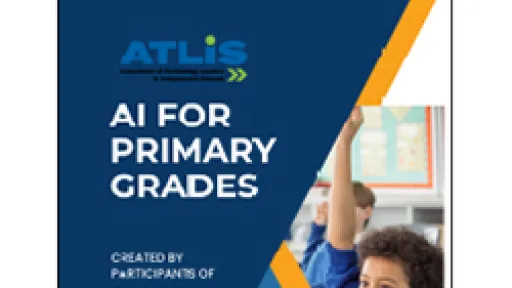For decades, the promise of educational technology has been clear: give students the tools and confidence to take ownership of their own learning. Now, with the rise of generative AI, that promise feels more within reach than ever—though it comes with new challenges and responsibilities for educators.
So here’s the big question: How can students and teachers become creators, problem-solvers, and lifelong learners using AI?
At Ed3 DAO, our answer is simple but powerful: use pedagogy as the north star for AI. Pedagogy should always guide the learning journey, ensuring that AI isn’t a gimmick but a meaningful tool to deepen inquiry, foster creativity, and empower students to thrive.
That’s why, in partnership with ATLIS, we’re offering a suite of three professional learning courses designed to help educators confidently integrate AI into their teaching practice. These courses are built for real classrooms, grounded in research, and focused on preparing students to lead their own learning journeys. Our north stars for these courses are Project Based Learning, Design Thinking, and Media Literacy.
One of the courses we’re most excited to share is the AI Empowered Project-Based Learning course. This asynchronous, self-paced program is crafted for busy teachers and tech leaders who want practical, ready-to-use strategies that align with sound pedagogy.
As you move through the modules, you’ll discover how AI can become an ally in designing meaningful, student-centered PBL experiences.
Here’s a closer look at the Module Highlights:
Module 1
How can teachers set clear outcomes, design engagement routines, and establish responsive AI use agreements to launch a purposeful PBL journey?
Module 2
How can teachers surface a real community problem, align it to my goals, and use AI to test and refine driving questions that spark deep inquiry?
Module 3
How can teachers structure inquiry cycles, teach source evaluation and synthesis, and partner with AI to widen investigation and creative thinking?
Module 4
How can teachers link classroom work to authentic audiences, plan field interactions, and use AI to map partners, contexts, and logistics for real-world impact?
Module 5
How can teachers gather learner insights, design flexible roles and pathways, and use AI to personalize scaffolds so every learner moves forward?
Module 6
How can teachers build regular reflection, combine self, peer, and educator feedback, and use AI to spot patterns that drive timely iteration?
Module 7
How can teachers define quality criteria, ideate public products, and use AI to strengthen clarity, accessibility, and reach of my showcase?
Module 8
How do teachers codify what works, develop creative AI workflows, and build reliable routines to sustain PBL across units?
Capstone: Design a PBL unit using the learnings from this course and integrate at least two AI tools to enhance the student learning experience.
By the end of the course, you’ll not only have hands-on experience with emerging AI tools—you’ll also walk away with your own AI Toolkit and Portfolio to put into action immediately in your classroom.
Course completion comes with a certificate and 8 TLIS CEUs, making this both a forward-looking and professionally rewarding opportunity.
Ready to dive deeper?
The course is available now—and it’s designed to help you and your students thrive in the age of AI.
“I really enjoy the focus on AI as a tool to use strategically and to help students learn and develop their skills rather than AI as a tool to do everything." - Educator from Texas



